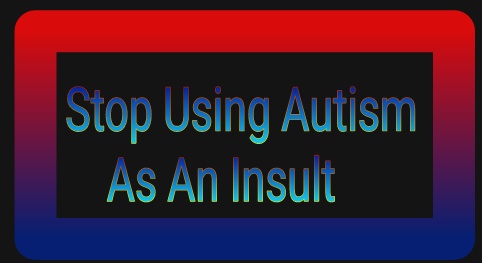Mental Illness as Insults: Think Carefully about Your Word Choice Before You Say It

March 6, 2018
A few years back at Wantagh Middle School, there was a campaign called “Spread the Word to End the Word” which focused on ending the use of the terms “retard” and “retarded” as insults. Since then, the use of the words in such a sense hasn’t been ended completely though it has been lessened; however, people are turning to a new word to use as an insult in “the R word”’s place.
Picture this: Three boys are in the cafeteria, and boy #1 is trying to get the attention of boy #2, who is playing a game on his phone. Boy #2 doesn’t pay attention to boy #1, and continues to play his game. Boy #1 complains to boy #3 that boy #2 isn’t paying attention to him.
“Hey, you!” shouts boy #3. “Stop being so autistic and pay attention to my friend!”
The use of the words “autism” and “autistic” as an insult is on the rise, and it’s causing lots of controversy – especially in this modern day and age, where more and more people are being diagnosed as autistic and more autistic people are becoming confident enough to speak up and “come out” about their autism.
I have not been diagnosed as autistic myself, though I have a handful of friends who have autism. I find the recent rise of the phrases “autism” and “autistic” used in the sense of insults a la “retard” and “retarded” to be offensive and disrespectful; every time I hear one of those words used as an insult, I actually feel offended. The terms are often misused when used as insults; anyone who likes things that would be considered “different” from what’s considered “normal,” or who acts “differently” than other people, might be insultingly dubbed “autistic” regardless of whether they really have autism or not. And it hurts.
When you call someone “autistic” as an insult, you don’t know who you could be offending. Maybe there’s someone with autism in the room with you, or someone who knows somebody who has autism. Using “autism” as an insult is dehumanizing to, and stereotypes and discriminates against, autistic people.
While there might not be any campaign like Spread the Word to End the Word out there to end the use of “autism” as an insult, that doesn’t mean you shouldn’t make a change. Think before you talk, and try not to say “retarded” or “autistic” when you could find a less offensive word to use – or better yet, just don’t use any insult at all. You never know who you might end up accidentally offending. And, if you find yourself offended by something someone says, don’t just say nothing. Be courageous and confident, speak up, and let a responsible adult know.











